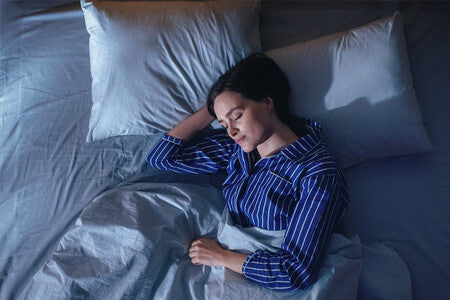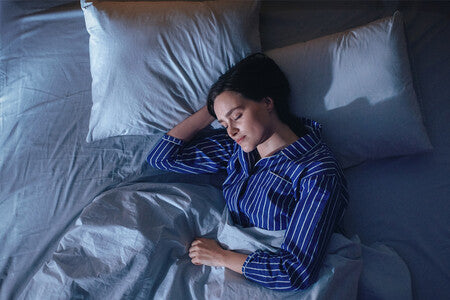The positive and negative correlations between sleep and vision
What do your eyes do while you’re dreaming?
So how does shut-eye impact eye health? Scientific research has reiterated that a lack of sleep can negatively impact vision, and to that effect, a good night’s rest can do just the opposite.
It’s no wonder that sleep deprivation often manifests in puffy eyes, drooping eyelids and dark circles. But the truth is, a poor sleep schedule impacts far more than the physical appearance of our eyes. It can also hinder their ability to heal and function properly.
We’re exploring the connection between sleep and sight, and the ways in which you can support your eye health by simply by getting the right amount of shut-eye every night.
It’s no wonder that sleep deprivation often manifests in puffy eyes, drooping eyelids and dark circles. But the truth is, a poor sleep schedule impacts far more than the physical appearance of our eyes. It can also hinder their ability to heal and function properly.
We’re exploring the connection between sleep and sight, and the ways in which you can support your eye health simply by getting the right amount of shut-eye every night.
The impact of sleep deprivation on eye health
Overnight, our bodies replenish their natural tear supply, which is key to staving off dry eye. Plus, like other major organs, sleep also offers essential time for healing and regenerating. A lack of sleep can spur a slew of eye-related symptoms, including:
● Dryness
● Itchiness
● Redness
● Twitching
● Blurred vision
● Sensitivity to light
Of course, a night of tossing and turning happens to all of us from time to time, but serious sleep deprivation can cause ongoing eye problems with possibly long-term side effects.
Of course, a night of tossing and turning happens to all of us from time to time, but serious sleep deprivation can cause ongoing eye issues with possibly long-term effects.
Sleep apnea and glaucoma
Beyond not getting sufficient sleep, some sleep disorders have been linked to certain eye disorders. Obstructive sleep apnea syndrome (OSAS)—which is when all or part of the upper airway is blocked during sleep—has been directly associated with a number of eye diseases, such as floppy eyelid syndrome and papilledema. Perhaps the most clear correlation, though, is to glaucoma.
In fact, research indicates that those who suffer from OSAS are about ten times more inclined to develop glaucoma than those who do not. Although the correlation between OSAS and sleep apnea is indisputable, the cause for the connection isn’t entirely understood by the medical community.
That said, there are some probable reasons, including that OSAS leads to lessened oxygen levels in the blood, which can impact the blood flow to the optic nerve. Sleep apnea can also lead to Anterior Ischemic Optic Neuropathy (AION), which is a sudden loss of vision—mostly experienced in older adults—as a result of a pause in blood flow to the front of the optic nerve.
This is one of the countless reasons why it's so important to get your eyes checked regularly, as eye doctors can often detect signs of sleep apnea during routine eye exams—and suggest mechanisms to mitigate it. If sleep apnea is caught and addressed early enough, it’s possible to prevent glaucoma altogether. Book an appointment today at an Visique clinic near you.
How much sleep is enough?
Generally speaking, it’s recommended that adults get at least seven hours of sleep per night to function at full capacity both physically and mentally. As far as eyes go, though, five hours on average is the minimum amount of time needed to hydrate and replenish them.
Getting seven hours of sleep or more will not only ensure your body’s natural tear supply has been adequately replenished, but it will also ensure you are mentally and physically primed to tackle the day ahead.
Ways to sleep better
Getting seven hours of sleep isn’t always easy, and for some people, it can feel impossible. Fortunately, there are small things you can do to improve your sleep quality and patterns. Here are a few useful tips:
1. Limit screen time before bed, including television. Any form of light exposure can disrupt sleep, so experts recommend powering down all devices at least 30 minutes before bedtime, which will also minimize eye strain. If you’re looking for some evening entertainment, opt for a book or podcast, and allow your eyes to unwind.
2. Reduce your daily intake of caffeine and avoid it entirely for a minimum of six hours before bed.
3. Exercise daily, as physical activity has shown to improve both sleep quality and duration. (It definitely tires you out.)
4. Set a schedule and follow it. It’s best to stay consistent and try to sleep and wake up at the same time every day. Once your body settles into a routine, it will become much easier to fall asleep at night and rise in the morning.
5. If your eyes are irritated or hard to open when waking up, speak to your optometrist about ensuring that your eyes are protected from drying out overnight.
Evidently, limited rest can wreak havoc on our vision, and getting the right amount of sleep can keep our eyes feeling fresh, hydrated and healthy. There are so many reasons why getting a good night’s sleep is important for our well-being. Keeping your eyes healthy is definitely one of them.
